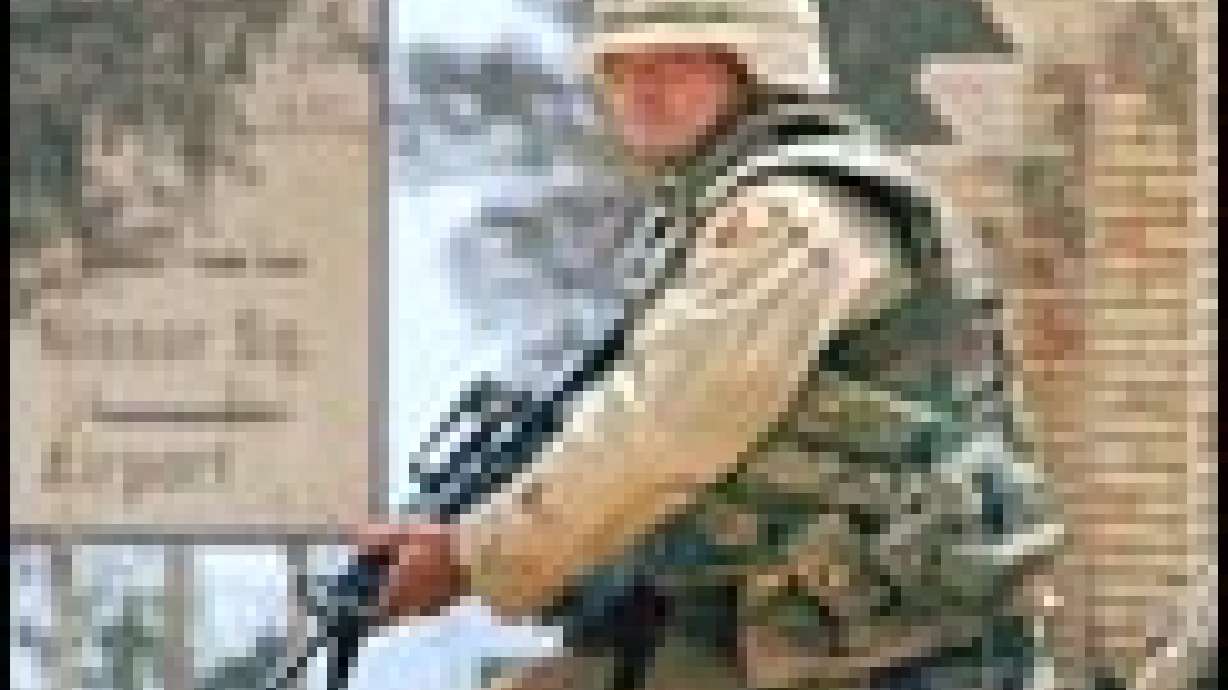Estimated read time: 4-5 minutes
This archived news story is available only for your personal, non-commercial use. Information in the story may be outdated or superseded by additional information. Reading or replaying the story in its archived form does not constitute a republication of the story.
KARBALA, Iraq (AP) -- A joint U.S.-Iraqi patrol enforcing a curfew clashed with gunmen guarding the headquarters of a Shiite cleric, setting off a firefight that killed three Americans and 10 Iraqis, including two security officers, the U.S. Central Command and witnesses said Friday.
In Baghdad, an American soldier from the 220th Military Police Brigade was killed and two were wounded when a roadside bomb exploded Friday morning. No further details were released.
The Americans involved in the firefight at the cleric's headquarters in this southern city were members of the 101st Airborne Division, said Maj. Mike Escudie of Central Command in Tampa, Fla. Seven Americans also were wounded in the clash, Central Command said.
U.S. combat deaths since major fighting ended May 1 passed the 100 mark after Friday's clash and now stand at 101.
Five Iraqi security personnel also were wounded in the attack near Imam Abbas Mosque in Karbala, 50 miles south of Baghdad.
The fighting began when coalition military police and Iraqi authorities investigated reports of armed men congregating on a road near the Imam Abbas mosque after a 9 p.m. curfew, Central Command said.
Malik Kazim, a gunman who said he participated in the battle, said the fighting involved armored vehicles and Humvees that passed the offices of a senior Shiite cleric, Mahmoud al-Hassani. The offices were guarded by at least 20 gunmen.
Karbala has been under curfew since Tuesday, and the U.S.-Iraqi patrol ordered the gunmen to go inside. When they refused, a shootout ensued, he said.
Intense gunfire -- small-arms fire and rocket-propelled grenades -- lasted about a half-hour as the U.S.-Iraqi patrol tried to "kill our master," Kazim said.
A man identifying himself as Abu Ali, an aide to al-Hassani, said the Americans started shooting "without any provocation or warning." Eight Iraqi guards were killed, he said.
Al-Hassani, who moved to Karbala from Baghdad after the fall of Saddam Hussein's regime in April, went to a secret location with his family Friday morning, Abu Ali said. An al-Hassani flier at the scene of the shootout denounced Iraqis cooperating with the Americans as "traitors."
Abu Ali said guards had been posted around al-Hassani's house since late August, when a car bomb in nearby Najaf killed a leading Shiite cleric and more than 80 other people.
Initial reports said the joint patrol was made up of Americans and Poles. But military officials said later no Poles were involved.
On Friday morning, large pools of blood were seen on the street and dozens of bullet holes, some large-caliber, were seen in the walls.
Al-Hassani is one of Karbala's lesser-known ayatollahs -- the highest clerical rank in Shiism. Rivalries among Shiite factions have led to sporadic violence recently, as Shiites suppressed under Saddam flex their new political muscle as a majority in Iraq.
Two Pentagon officials said Friday the military was investigating whether the shootout was an ambush by the Shiite militia. The U.S.-led authorities in Iraq have banned private militias and say they are committed to disarming them while trying to minimize violence.
Gunfire erupted again Friday morning in the same area of Karbala, where Thursday's late-night encounter may have signaled a new determination by the Americans to disarm religious-based militias and enforce curfews. Sporadic clashes continued for about 12 hours after the initial battle.
An armored personnel carrier of the U.S.-led coalition opened fire Friday morning as screaming men, women and children fled for cover. Shiite gunmen defiantly shouted, "Allahu Akbar!" -- "God is great!" The gunfire soon ended, but young Shiites still manned rooftop and street positions with assault rifles and rocket-propelled grenades.
The gunmen abandoned their positions several hours later, but several Polish jeeps and armored cars remained stationed less than 200 yards from the cleric's house. At least two Polish snipers could be seen on nearby rooftops.
Polish soldiers maintain responsibility for Karbala, but Polish officials said those troops were not involved in Thursday's clash.
In Baghdad's Sadr City district, a stronghold for Shiite cleric Muqtada al-Sadr, about 6,000 Shiites chanted "No No U.S.A., Yes Yes Muqtada" at Friday prayers.
Hundreds of yards away, U.S. tanks, armored personnel carriers and dozens of soldiers blocked off streets leading to a building housing the Sadr City council.
Al-Sadr is a 30-year-old cleric who has been exhorting followers with fiery anti-American sermons but has stopped short of directly calling for attacks on U.S. military forces.
Iraqi Foreign Minister Hoshyar Zebari said in comments published Friday that al-Sadr's militia will be disarmed by force if necessary. Zebari's comments were published in the London-based Arabic daily newspaper Al Hayat.
Polish forces lead an international brigade responsible for postwar security in the Karbala area, commanding some 9,500 peacekeepers from 21 nations, including 2,400 Poles. The 31,000-square-mile area was handed over by American forces last month.
On Thursday, the U.N. Security Council unanimously approved a resolution aimed at attracting more troops and money to help stabilize Iraq and speed its independence.
(Copyright 2003 by The Associated Press. All Rights Reserved.)








